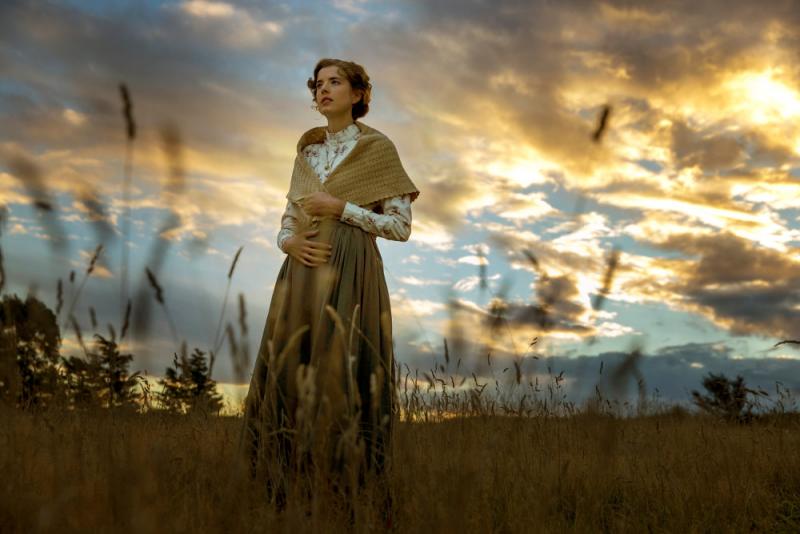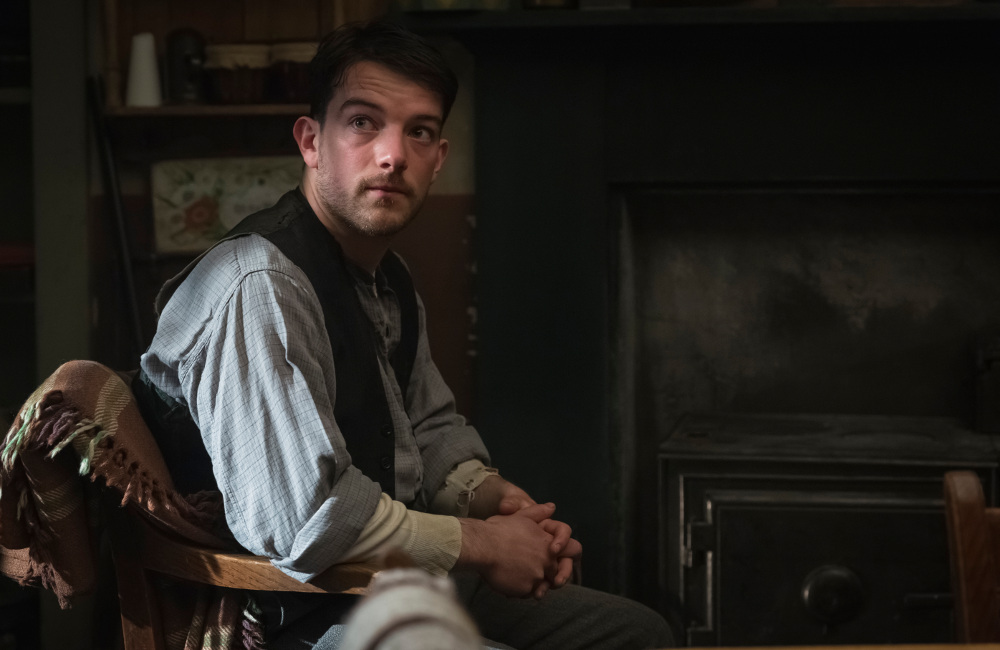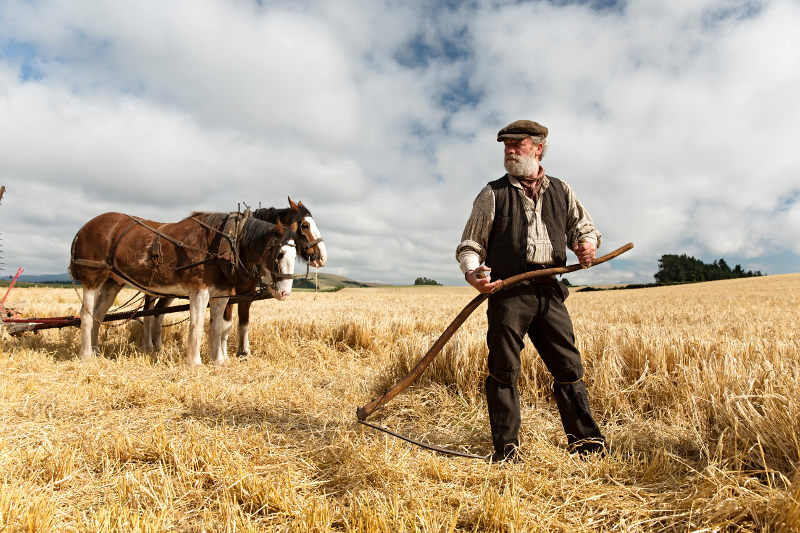Sunset Song | reviews, news & interviews
Sunset Song
Sunset Song
Visually stunning, emotionally devastating hymn to rural life from Terence Davies

There’s been a hugely protracted production history behind Sunset Song. Terence Davies first mooted a screen adaptation of Lewis Grassic Gibbon’s 1932 novel of northern Scottish farming folk way back in 2000, soon after the success of his Edith Wharton pic The House of Mirth.
In many ways it’s a pretty radical rethink of Gibbon’s novel, which charts the fortunes of hardy heroine Chris Guthrie, an independent-minded young woman in what’s now Aberdeenshire, from school through to love, marriage and beyond, taking in an abusive father, a mother’s suicide and, crucially, her unbreakable connection with the rural landscape she inhabits.
 Gibbon is revered for challenging cosy, romanticised depictions of Scotland with his harsh, unforgiving (some might say miserabilist) portrayal of Scottish rural life. Yet Davies remoulds the story into something altogether more symbolic, almost mythic. There’s a sense of inevitability to Davies’s gently unfolding storytelling, as though what he’s showing us is one of the world’s great epic stories. But behind it all lies a taut structure and careful pacing. Sunset Song feels every minute of the 135 it lasts, but Davies plays a remarkable Tardis-like time trick: a deceptively slow-moving plot with a huge amount of narrative packed into it.
Gibbon is revered for challenging cosy, romanticised depictions of Scotland with his harsh, unforgiving (some might say miserabilist) portrayal of Scottish rural life. Yet Davies remoulds the story into something altogether more symbolic, almost mythic. There’s a sense of inevitability to Davies’s gently unfolding storytelling, as though what he’s showing us is one of the world’s great epic stories. But behind it all lies a taut structure and careful pacing. Sunset Song feels every minute of the 135 it lasts, but Davies plays a remarkable Tardis-like time trick: a deceptively slow-moving plot with a huge amount of narrative packed into it.
Model-turned-actress Agyness Deyn is strong, if occasionally a little unreadable, in the central role, combining determination and vulnerability to eminently watchable effect. But it’s Scottish actor Kevin Guthrie (pictured above), as Chris’s suitor Ewan Tavendale, who sparks the movie into dramatic life. He doesn’t appear until an hour or so in – introduced in a solid close-up that tells us everything we need to know about his imminent importance – but his sensitive, (literally) wide-eyed performance is heartbreakingly tender. The film’s second act, focusing on Chris and Ewan’s idyllic relationship, is its magical, glowing heart, and it comes after the horrifying, mundane violence doled out by Chris’s religious-obsessed father. Although whether we really need yet another mad-dad offering from Peter Mullan (pictured below) – strong though he is here – is probably debatable.
 Where the film falls down, however, is in its third act, when the horrors of the First World War intrude on Chris and Ewan’s rural idyll. Ewan’s return from the trenches brutalised almost beyond recognition strikes a horribly jarring note. And despite the poetry of Davies’s slowly moving aerial shot of the war zone – at once beautiful and appalling – his final sequence feels unnecessarily manipulative – in fact, simply unnecessary, since by then we know the facts already.
Where the film falls down, however, is in its third act, when the horrors of the First World War intrude on Chris and Ewan’s rural idyll. Ewan’s return from the trenches brutalised almost beyond recognition strikes a horribly jarring note. And despite the poetry of Davies’s slowly moving aerial shot of the war zone – at once beautiful and appalling – his final sequence feels unnecessarily manipulative – in fact, simply unnecessary, since by then we know the facts already.
That said, it’s hard not to be swept along by the sheer painterly beauty and emotional intensity of Davies’s achievement, conveyed in the visual grandeur of Michael McDonough’s remarkable cinematography. It’s all a bit too good to be true – as in endless scenes of sun-drenched rippling wheat fields, or a heart-swelling flirtation scene with Chris and Ewan magically surrounded by a scampering flock of sheep. But it's proud of its artifice, and achingly beautiful at the same time.
Sunset Song is quietly devastating in its emotional impact, but its passions are held firmly in check. And Davies’s masterful exploration of his underlying themes – the strength of the human spirit, the wonders of nature, even the brutality and fickleness of fate – sweeps everything before them.
Overleaf: watch the trailer for Sunset Song
The future of Arts Journalism
You can stop theartsdesk.com closing!
We urgently need financing to survive. Our fundraising drive has thus far raised £49,000 but we need to reach £100,000 or we will be forced to close. Please contribute here: https://gofund.me/c3f6033d
And if you can forward this information to anyone who might assist, we’d be grateful.

Subscribe to theartsdesk.com
Thank you for continuing to read our work on theartsdesk.com. For unlimited access to every article in its entirety, including our archive of more than 15,000 pieces, we're asking for £5 per month or £40 per year. We feel it's a very good deal, and hope you do too.
To take a subscription now simply click here.
And if you're looking for that extra gift for a friend or family member, why not treat them to a theartsdesk.com gift subscription?
more Film
 The Mastermind review - another slim but nourishing slice of Americana from Kelly Reichardt
Josh O'Connor is perfect casting as a cocky middle-class American adrift in the 1970s
The Mastermind review - another slim but nourishing slice of Americana from Kelly Reichardt
Josh O'Connor is perfect casting as a cocky middle-class American adrift in the 1970s
 Springsteen: Deliver Me From Nowhere review - the story of the Boss who isn't boss of his own head
A brooding trip on the Bruce Springsteen highway of hard knocks
Springsteen: Deliver Me From Nowhere review - the story of the Boss who isn't boss of his own head
A brooding trip on the Bruce Springsteen highway of hard knocks
 The Perfect Neighbor, Netflix review - Florida found-footage documentary is a harrowing watch
Sundance winner chronicles a death that should have been prevented
The Perfect Neighbor, Netflix review - Florida found-footage documentary is a harrowing watch
Sundance winner chronicles a death that should have been prevented
 Blu-ray: Le Quai des Brumes
Love twinkles in the gloom of Marcel Carné’s fogbound French poetic realist classic
Blu-ray: Le Quai des Brumes
Love twinkles in the gloom of Marcel Carné’s fogbound French poetic realist classic
 Frankenstein review - the Prometheus of the charnel house
Guillermo del Toro is fitfully inspired, but often lost in long-held ambitions
Frankenstein review - the Prometheus of the charnel house
Guillermo del Toro is fitfully inspired, but often lost in long-held ambitions
 London Film Festival 2025 - a Korean masterclass in black comedy and a Camus classic effectively realised
New films from Park Chan-wook, Gianfranco Rosi, François Ozon, Ildikó Enyedi and more
London Film Festival 2025 - a Korean masterclass in black comedy and a Camus classic effectively realised
New films from Park Chan-wook, Gianfranco Rosi, François Ozon, Ildikó Enyedi and more
 After the Hunt review - muddled #MeToo provocation
Julia Roberts excels despite misfiring drama
After the Hunt review - muddled #MeToo provocation
Julia Roberts excels despite misfiring drama
 London Film Festival 2025 - Bradley Cooper channels John Bishop, the Boss goes to Nebraska, and a French pandemic
... not to mention Kristen Stewart's directing debut and a punchy prison drama
London Film Festival 2025 - Bradley Cooper channels John Bishop, the Boss goes to Nebraska, and a French pandemic
... not to mention Kristen Stewart's directing debut and a punchy prison drama
 Ballad of a Small Player review - Colin Farrell's all in as a gambler down on his luck
Conclave director Edward Berger swaps the Vatican for Asia's sin city
Ballad of a Small Player review - Colin Farrell's all in as a gambler down on his luck
Conclave director Edward Berger swaps the Vatican for Asia's sin city
 London Film Festival 2025 - from paranoia in Brazil and Iran, to light relief in New York and Tuscany
'Jay Kelly' disappoints, 'It Was Just an Accident' doesn't
London Film Festival 2025 - from paranoia in Brazil and Iran, to light relief in New York and Tuscany
'Jay Kelly' disappoints, 'It Was Just an Accident' doesn't
 Iron Ladies review - working-class heroines of the Miners' Strike
Documentary salutes the staunch women who fought Thatcher's pit closures
Iron Ladies review - working-class heroines of the Miners' Strike
Documentary salutes the staunch women who fought Thatcher's pit closures
 Blu-ray: The Man in the White Suit
Ealing Studios' prescient black comedy, as sharp as ever
Blu-ray: The Man in the White Suit
Ealing Studios' prescient black comedy, as sharp as ever

Add comment